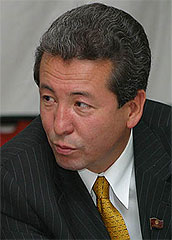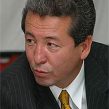
KYRGYZSTAN ADOPTS GEORGIAN MODEL TO FIGHT CORRUPTION
Publication: Eurasia Daily Monitor Volume: 2 Issue: 110
By:

The Kyrgyz government is determined to investigate, prosecute, and eliminate corruption in the state. Deputy Prime Minister Daniyar Usenov recently announced that more associates of former president Askar Akayev would find themselves in prison in the coming weeks. “Kyrgyzstan will adhere to the Georgian experience of coping with corruption by the former regime,” declared Adakhan Madumarov, another deputy prime minister. Azimbek Beknazarov, interim prosecutor-general, agrees with the anti-corruption drive, giving it a motto: “Return what was stolen and sleep calmly” (Kabar, June 4).
According to Modumarov, the new regimes in Georgia and Ukraine have shown impressive results in fighting corruption, even increasing state budgets by up to six times since the revolutions. Therefore he favors adapting Georgia’s relevant legislation to deal with corruption in Kyrgyzstan: “By not inventing the bicycle, we can learn from them, and if Georgia achieved this in one and a half years, why don’t we, using the moment, reach the same results in a shorter time” (Kabar, June 4). He disclosed that he had already passed along copies of documents on fighting corruption given to him by the Georgian Ministry of Foreign Affairs and prosecutor-general.
The government’s most-wanted figures include former prime minister Nikolai Tanayev and Akayev’s son-in-law, Adil Toigonbayev, who is a Kazakh citizen. Both men are accused of extreme instances of corruption and face legal prosecution. There are concrete embezzlement charges against Tanayev, and Kyrgyzstan’s top prosecutor has issued an arrest warrant, but his current location is unknown (Gazeta.kg, June 6). Toigonbayev’s case might prove especially difficult to prosecute, because his influence on local businesses was effectively veiled by legal means; many of the enterprises he controlled were registered under different owners. The Kyrgyz prosecutor-general is waiting for the Kazakh embassy in Bishkek to recognize the charges against Toigonbayev.
A number of prominent individuals have been accused of paying bribes to Akayev, including the head of the National Bank, Ulan Sarbanov, who is suspected of illegally transferring $480 million to the president’s account in 1999. Sarbanov denies any charges, saying he acted within the law and that it is Akayev who must be held responsible for the money. Some politicians voluntarily returned large sums to the state, as they believe the funds were illegally distributed to them during Akayev’s rule. Yet until the 800 kilograms of gold reserves that disappeared in 1995 are found, the Augean stables of the previous regime will not be clean. According to preliminary investigations, the reserves might have been exported to a European state. Kyrgyz officials have not ruled out the possibility of appealing to Interpol.
Kyrgyzstan’s external debt currently stands at $2 billion and exceeds the state budget several times over. Credits and investments received by Kyrgyzstan in the last fourteen years were “effectively vandalized by the previous regimes,” according to one member of the state commission on stabilizing the country. According to the commission’s conclusions, inconsistent economic reforms in recent years completely destroyed the Kyrgyz economy (Kabar, June 3). For example, although land was provided to farmers, no financial or methodic assistance followed the land distribution. According to Acting President Kurmanbek Bakiyev, this half-reform wasted vast agricultural territories and destroyed many light industries (Kabar, June 6).
The Kyrgyz government hopes that cracking down on corruption will increase the state budget. The government has repeatedly explained that, thanks to reduced rates of corruption and voluntary repayments of government money, teachers, doctors, and police could see their monthly salaries increase by up to 50%. Further, a number of enterprises paid higher taxes in May, including the Kyrgyz-Canadian gold mining company and the Bitel GSM cellular operator. The Kyrgyz Ministry of Finance assures that, with the present conditions set by the Paris Club of Creditors, Bishkek should reach debt sustainability by the end of 2008.
Some Kyrgyz think that the interim government’s efforts to fight corruption are unrealistic and all the talk of increasing the budget and cleaning up government are merely pre-election rhetoric. According to local experts, the current activities of the Kyrgyz officials represent outright state extortion and a fiscal fleecing of the private sector that, in the long run, might be positive for the country’s development. However, the effort presents a moral dilemma at the present: “Eradicating corruption cannot always be fair and transparent, but will involve slinging mud at the government’s unwanted forces,” according to one former civil service employee in Bishkek. Those against such an extensive drive to end corruption also point to some members of the interim government who also have private businesses that allegedly started-up with state funds, but whose records will not be investigated. Others decry the fight against corruption as a mere “state racket” lacking legitimacy.
Still, compared to other Central Asian states, the Kyrgyz interim government functions amid a higher degree of transparency, thanks to the local and foreign press and the NGO sector. Whether than transparency continues through the July 10 presidential elections remains to be seen. There are 22 presidential candidates registered for the race, but reportedly only half of them fulfilled all the necessary requirements.




